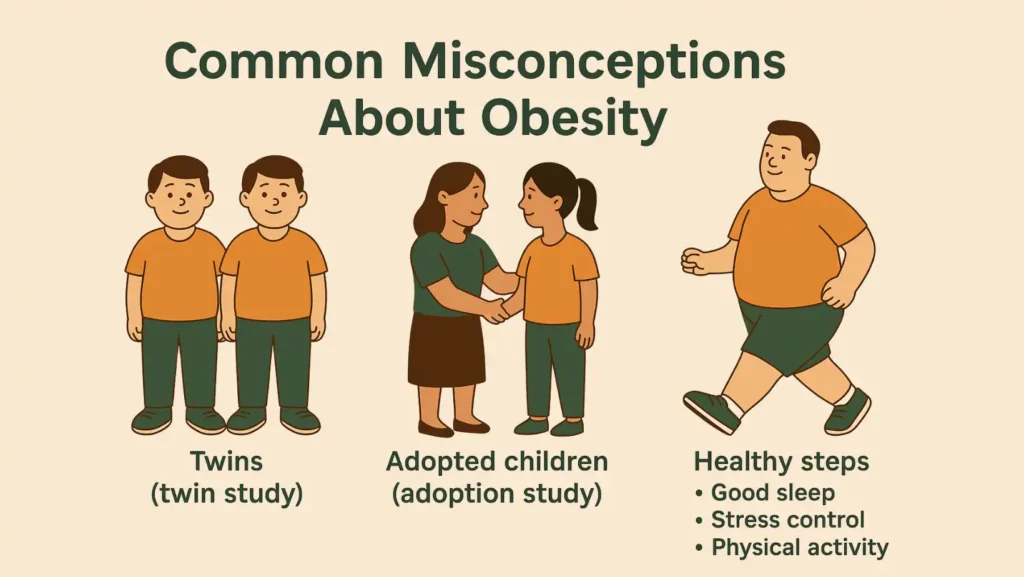Myths about obesity shape how people see health, food, and weight. These myths are often repeated so many times that they sound like facts. But when we look closer, we see science tells a different story. Believing wrong ideas about weight can harm people’s health, spread shame, and stop real progress.
Table of Contents
ToggleBy breaking down these obesity myths and facts, we gain a clearer picture of how the body works, what raises health risks, and how to improve care.
To Reduce Obesity, Just Eat Less And Move More
This is the most popular of all common misconceptions about obesity. The idea says the answer is simple: eat less food and exercise more. But weight science is not this black-and-white. This message ignores what causes obesity at deeper levels.
Why This Obesity Myth Is Misleading
Calories matter, but only focusing on calories misses the real story. Hormones like leptin, ghrelin, and insulin control appetite and fat storage. When these are out of balance, a person can gain weight even on moderate food intake.
Other factors also play a role:
- Sleep deprivation raises hunger hormones.
- Stress increases cortisol, which can drive fat gain around the belly.
- Medications such as steroids or antidepressants can affect weight.
- Mental health problems like depression change eating habits.
So when people blame individuals, they ignore the science. This blame feeds weight stigma, which lowers self-esteem, worsens negative body image, and keeps people from seeking medical help.
What Really Causes Obesity? (Obesity Causes Explained)
The causes of obesity are many and linked. Let’s break them down:
| Category | Factors That Influence Weight | Example |
| Biological | Genes, hormones, metabolism | FTO gene variant, thyroid imbalance |
| Lifestyle | Diet, physical activity, sleep habits | Fast food, inactive jobs, poor sleep |
| Psychological | Mental health, stress, trauma | Emotional eating, binge eating |
| Environmental | Access to healthy food, safety | Food deserts, unsafe streets |
| Medical | Chronic disease, medication | Diabetes meds, arthritis limits activity |
Large reviews, such as meta-analysis studies, confirm that no single factor explains what causes obese people to gain weight. Each case is unique. This is why simple slogans like “eat less, move more” mislead the public.
Obesity Directly Causes Diabete
Another myth says obesity alone causes diabetes. The truth is more complex.
Misconceptions About Obesity And Diabetes
Yes, excess fat increases insulin resistance. But not everyone with obesity develops Type 2 diabetes. And not everyone with diabetes has obesity. Genetics, diet, and environment all contribute.
- Type 1 diabetes is autoimmune and unrelated to weight.
- Gestational diabetes occurs in pregnancy due to hormones.
- Type 2 diabetes risk increases with weight but is not guaranteed.
So, obesity raises the odds, but it does not act alone. This is one of the most important obesity misconceptions that health experts want to correct.
Health Problems Caused By Obesity (Beyond Diabetes)
When we talk about health problems caused by obesity, diabetes gets the most attention. But obesity links to many other risks:
- Cardiovascular disease
- High blood pressure
- Osteoarthritis (joint wear and tear)
- Sleep apnea and breathing issues
- Chronic pain in back and knees
- Depression and negative body image
- Higher chance of certain cancers
This list shows why both the World Health Organization (WHO) and the Centers for Disease Control and Prevention (CDC) call obesity a major public health concern.
People With Obesity Are Lazy
This myth links weight with laziness. It suggests people do not care about health. In reality, this is a harmful stereotype.
Breaking The Stereotype
Many people with obesity juggle jobs, families, and busy schedules. They are far from lazy. But barriers stop them from moving as much as they want:
- Unsafe neighborhoods that limit outdoor activity.
- Jobs with long sitting hours.
- Chronic pain and arthritis that reduce movement.
- Lack of affordable gyms or parks.
When society blames laziness, it spreads weight stigma. This stigma prevents fair treatment, which lowers obesity awareness and stops better policies.
Lifestyle Vs. Biological Causes Of Obesity
Obesity and lifestyle choices like diet and exercise matter. But they do not tell the full story. Genetics play a major role.
- Twins (twin study) show strong genetic influence on body mass.
- Adopted children (adoption study) often resemble their biological parents’ body size, not adoptive parents.
- The FTO gene variant links to higher fat storage.
But genetics are not destiny. People can still change habits to improve health. For example, enough sleep lowers hunger. Stress management reduces overeating. Medicines and weight loss interventions also help when lifestyle changes alone are not enough.
If Your Close Relatives Have Obesity, You Will Too
Another common myth says if your parents or siblings have obesity, you will definitely have it too. This is false.
Genetics Vs. Environment In Obesity Causes
Genes do increase risk. Studies like genome-wide association studies (GWAS) show many small DNA changes linked to weight. But the environment matters as much as genetics.
Example: A child with genes linked to weight gain may stay healthy if raised in an active home with access to balanced meals. Another child without those genes may still gain weight if raised in poor food environments.
This proves that both biology and surroundings shape what causes obesity.
Common Misconceptions About Obesity And Heredity
People often mistake family history for fate. This is a common misconception about obesity. While genes matter, they don’t lock in outcomes.
- Twins (twin study) show shared genes explain some similarity.
- Adopted children (adoption study) prove environment shapes habits.
- Healthy steps like good sleep, stress control, and physical activity reduce genetic risk.
So, heredity gives a map, but lifestyle, stress, and care write the journey.
Obesity Does Not Impact Health
Some say obesity has no impact on health. This is misleading. While not every person with obesity is sick, the average risk of disease is higher.
Health Risks And Complications Caused By Obesity
Obesity increases chances of many conditions:
- Cardiovascular disease and heart strain.
- High blood pressure leading to stroke.
- Sleep apnea causes poor sleep and daytime fatigue.
- Depression is linked with stigma and negative body image.
- Joint problems like osteoarthritis.
Doctors use tools like Body Mass Index (BMI) to screen, though BMI is not perfect. A normal BMI person can have hidden fat (called “hidden obesity”). This shows the limits of one number.
Facts Vs. Myths About Obesity And Long-Term Wellness
Not everyone with higher weight faces health decline. Some live long, healthy lives. This is called the “obesity paradox” in research. Still, average risk rises with extra fat.
Good care looks at more than weight. Doctors check blood sugar,, fitness, and mood. With the right mix of diet help, therapy, and activity, people improve health even without large weight loss.
The Bottom Line
Obesity is not caused by laziness or just overeating. It results from complex links between biology, lifestyle, environment, and psychology. Stigma and diet culture myths do more harm than good. Real care should focus on obesity education, science-based help, and respect for patients.
Breaking obesity myths and facts apart is the first step toward fair treatment. By raising obesity awareness, society can build healthier systems and reduce bias. That shift matters more than repeating slogans that blame people.
FAQs
What are five health problems that may be related to obesity?
Obesity links to Type 2 diabetes, heart disease, high blood pressure, sleep apnea, and joint problems like osteoarthritis. Each problem raises long-term health risks.
What are the 4 M’s of obesity?
The 4 M’s are mental, metabolic, mechanical, and monetary. Doctors use them to assess how obesity affects health and life.
What is the obesity paradox?
It refers to research where some people with obesity show better survival in certain illnesses. It highlights that weight alone is not the only health measure.
What is a surprising fact about obesity?
Even normal-weight people can have hidden fat around organs. This condition is called hidden obesity, and it increases health risks even when BMI looks normal.
What are the four pillars of obesity?
The pillars are nutrition, physical activity, sleep, and mental health. Addressing all four improves outcomes in obesity treatment plans.
What is the obesity code theory?
The theory explains that hormones like insulin drive fat storage. It suggests balancing hormones is as important as calorie control for weight management.
What is hidden obesity?
Hidden obesity is when someone has normal BMI but high body fat and low muscle. It raises risks of diabetes and heart disease without looking overweight.

This article is medically reviewed by Dr. Chandril Chugh, Board-Certified Neurologist, providing expert insights and reliable health information.
Dr. Chandril Chugh is a U.S.-trained neurologist with over a decade of experience. Known for his compassionate care, he specializes in treating neurological conditions such as migraines, epilepsy, and Parkinson’s disease. Dr. Chugh is highly regarded for his patient-centered approach and dedication to providing personalized care.









